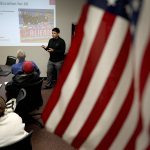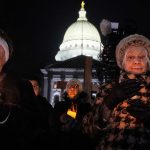
The Kiel school district’s closure of a Title IX investigation under pressure sends a “chilling message” expert says. But some residents tell LGBTQ youth “you are not alone.”
On the day of the third bomb threat, a bell echoed through Kiel, Wisconsin’s empty middle school. Students had gone home days ago after the first bomb threat, and they would finish the school year virtually. Graduation ceremonies were postponed. Sports games canceled. The Memorial Day parade? Nixed.
Smoky clouds hung like the pall that had enveloped the town in recent weeks. Neighbors grew suspicious of neighbors. Residents peeked out of windows; few ventured into the streets of this northeastern Wisconsin town of 4,000.
Many who spoke to a reporter requested anonymity and out-of-view meeting spots.
“It feels like we’ve been hijacked by something bigger than Kiel,” one school parent said, sitting by the banks of the Sheboygan River. “A year ago, two weeks ago, I wouldn’t have expected any of this. It’s an unbelievable scenario.”
Even before the bomb threats, the possibility of violence chilled conversations. Those who spoke publicly risked stepping into a vicious vortex of Facebook brawls. By May, Kiel’s political factions clashed over the direction of schools, public libraries and even the local farmer’s market.
Kiel’s paralysis in late May and early June followed a descent into incivility that shares elements of school board fights across the country — fueled by a cocktail of political tribalism, COVID-19 anxiety, false claims of election fraud and racial tensions following the Minneapolis police murder of George Floyd. The town’s turmoil offers deeply divided Wisconsin an extreme example of what can happen when partisan misinformation aggravates the resentment and distrust already festering in a community.
A news event shook Kiel in mid-May. That’s when the parents of three Kiel Middle School boys told news outlets that their children were under investigation for violating Title IX — a federal civil rights law that prohibits sex-based discrimination in schools — for allegedly bullying a transgender student.
The parents were outraged at the school for what the families described as the mistaken use of the wrong pronouns — using “she” to address the transgender student, who went by “they/them” pronouns. Luke Berg, an attorney from the powerful conservative law firm Wisconsin Institute for Law and Liberty (WILL), represented the accused boys. The investigation violated the boys’ right to free speech, he argued.
The public has yet to hear the transgender student’s side of the story, and federal privacy laws shield those details. Berg acknowledged that WILL withheld some details from the narrative it pushed to the media, including hyper-partisan juggernauts Newsmax and Fox News’ Laura Ingraham.
A Kiel music teacher’s report flagged four or five incidents between the boys and the transgender student, Berg said. Rose Rabidoux, the mother of one of the accused boys, added that the teacher documented incidents across multiple days, not an isolated conversation in class. She acknowledged that one of the boys once “lashed out” and threw food at the transgender student — none of which was revealed in initial media interviews.
But the one-sided story had already gone viral after a conservative Twitter account posted the name of the school principal involved in investigating the complaint to its 1.3 million followers. As the story ricocheted across the mediascape, “hateful” messages poured in to school staff, according to Kiel police.
In the days that followed the first bomb threat on May 23, residents phoned police on most anything that appeared suspicious, including a news reporter photographing the library. “People are really amped up,” an officer said while confirming the reporter’s identification. “We’re getting calls about everything.”
In the backdrop, mass shootings — first in Buffalo, New York, then Uvalde, Texas — only heightened fears.
Over nine days, six emailed bomb threats would land in school, police and news media inboxes, and the list of targets grew. First, the middle school, then multiple Kiel schools. Eventually all schools, the public library, city hall, wastewater treatment plant, stores and all roads into and out of the city.
Effectively holding Kiel’s core institutions hostage, an anonymous emailer warned the school district to drop the Title IX investigation by June 3 or face additional threats.
On June 2, school board members emerged from a closed meeting to pronounce the Title IX investigation “closed” in an unsigned letter.
WILL and some Kiel residents welcomed the result, while others suggested that school board members submitted to a terrorist’s demands. The person who sent the threats acknowledged the investigation’s closure in a follow up message, but promised threats to any Wisconsin school district attempting to investigate similar complaints in the future, according to WBAY, which received the email.
Stuart Long, a school board member, said the board did not let the threats dictate the outcome, but he acknowledged that they expedited deliberations.
“Did we cave? Absolutely not, we did not cave. Were the threats keeping our feet to the fire to keep and pushing us towards a resolution maybe sooner than later? I would have to say yes,” Long said. “It was expedited in the sense that everybody wanted this to end.”
Questions loom about how the outcome might affect future Wisconsin school investigations — and about what Kiel’s saga indicates about the trajectory of Wisconsin’s democracy.
The district’s swift closure of the investigation will send a chilling message to schools and districts that protecting transgender students could put them in danger, said Elizabeth Tang, senior counsel for education and workplace justice at the National Women’s Law Center.
“The right wing extremists will see that this tactic has worked,” she said. “Any reasonable person would conclude that an anti-trans terrorist used threats to force the school to close its Title IX investigation.”
‘The water was boiling’
Residents long saw Kiel as a place where families stroll along river banks after grabbing a bite at Dairy Queen. At the Kiel Picnic, the summer’s premier event, parents send their kids to the tilt-a-whirl, grab a beer, then make the celebration Wisconsin-official with fried cheese curds from the Future Farmers of America stand.
But sometime over the past two years, an insidious force began tearing at the community’s fabric. Exactly when that shift started depends on whom you ask, but Kiel Police Chief Dave Funkhouser said it started in the schools.
“The political atmosphere has definitely been amped up with the school board elections, and there was a critical race theory issue going around,” Funkhouser said. “The water was boiling, and when (the Title IX investigation) came to the light, it really kind of brought the pot to a full boil and overflowed at times.”
The Title IX-related backlash poured gasoline on Kiel’s political bonfire, but an earlier bullying investigation provided the kindling.
In July 2020, two months after Floyd’s murder and amid nationwide protests against violence inflicted upon Black Americans, the mother of a Black Kiel High School student discovered racist messages in her son’s football teammate group chat.
She took the messages to school officials, and the superintendent eventually filed a complaint on her behalf with the school district. When the school district took little action, the ACLU helped her escalate the complaint to the Wisconsin Department of Public Instruction. As part of a settlement, the school district hired a consultant to educate staff and students about racism and harassment.
Later, in 2021, a local resident accused the consultant of promoting critical race theory. Soon a faction of the mostly Wite community viewed the theory as one of the biggest threats to Kiel’s children.
CRT is a decades-old academic concept asserting that White Supremacy from America’s past lives on in its laws and institutions — shaping racial disparities across society today. But in the early days of the pandemic, writer Christopher Rufo sharpened the phrase into a kind of weaponized, catch-all for the “woke” racial ideologies that progressives back and conservatives scorn. “Critical race theory is the perfect villain,” he told the New Yorker in 2021.
Republican lawmakers nationwide have since pushed often vague bans on CRT and broader efforts to promote diversity, equity and inclusion in public schools, despite a lack of evidence that K-12 schools taught or endorsed the academic theory.
Wisconsin has some of the country’s starkest disparities between White and Black residents in education, public health, housing, criminal justice and income. But in late 2021 and early 2022, Wisconsin’s Republican-controlled Legislature passed legislation to prohibit educators from referencing a host of concepts, including “critical race theory,” “multiculturalism,” “equity,” and “social justice.” Democratic Gov. Tony Evers vetoed the bill.
The anti-CRT messages spilled onto the pages of the Tri-County News, Kiel’s newspaper.
“My mother and her family fled Russia and came to America to escape Marxism. Now it’s here in the form of CRT!” wrote Dennis Steinhardt, the brother of Kiel Mayor Michael Steinhardt.
One group, Tri-County Citizens, coalesced around an effort to keep CRT out of schools. Its website, which has since stopped functioning, prominently featured a video of Rufo asserting a connection between CRT and Marxism. Tri-County Citizens and another group, Common Sense Kiel, accused school board incumbents of advancing CRT and backed three challengers for their seats. The challengers did not respond to interview requests.
The school district’s handling of race suddenly dominated the school board contest, alongside falling pandemic-era test scores and false claims of “pornography” in the local library. The weaponization of CRT had worked — making a faction in Kiel more concerned about a manufactured threat than the documented bullying of a Black student.
The bullied student eventually transferred to a more diverse neighboring school district, where he graduated this spring.
A spoon at a knife fight
Tony Johannes knew that his school board seat was in jeopardy in April when he read a letter in the newspaper titled “God remains in charge.”
“Christianity and Critical Race Theory (CRT) cannot coexist; therefore, I cannot vote for any of the current board members who voted to support CRT,” it said.
Johannes, who held his seat for only six months after his appointment to the board, describes himself as “just a math teacher from Sheboygan who likes to watch the Bucks.” The letter in the paper confused him; he and his family are church-going Christians — he previously served as his church’s president, he said, and he’d never endorsed CRT.
“That was the moment I realized I was in trouble,” he said. “People either had their mind made up or they were no longer willing to listen.”
Just days earlier, a group of 70 local teachers sought to correct CRT-related inaccuracies in their own letter to the editor.
“First, Critical Race Theory is an academic legal theory taught in higher education. We discuss diversity,” the letter stated. “We discuss tolerance and respect to maintain a school that is a safe and welcoming place for all of our students.”
But Johannes saw his challengers’ message as louder and more persuasive than his stance that the school board should focus on preparing kids for college or careers when they graduate.
He also appeared to be financially outmatched. Glossy, expensive looking banners touted his challengers, while the marker ink on Johannes’ hand-drawn signs bled in the rain.
“It felt like I was bringing a spoon to a knife fight,” Johannes said.
The school board challengers narrowly swept three incumbents, giving self-professed anti-CRT members a majority on the seven-member board.
Pushing book bans
School board incumbents faced a whack-a-mole battle against misinformation. Their challengers’ attack lines morphed faster than they could respond, roping in other Kiel institutions along the way. That included the public library.
The library’s trouble started in November 2021, when a man called police to claim that he spotted pornography on the shelves.
The call put two books under the microscope. One, “Making a Baby,” deals with pregnancy; the other, “It’s Perfectly Normal,” contains illustrations of human anatomy, gender and sexuality — “something that a parent and child could sit down together to read and open a conversation about the human body,” said Julia Davis, director of the Kiel Public Library.
That book also has images of same-sex couples, which helps explain why the American Library Association has four times since 2003 listed it among the most challenged books of the year.
Upon visiting the library, Funkhouser, the police chief, saw the books’ cartoon-like drawings of embracing couples.
“The content of the books was clearly intended, in my opinion, to be educational and informative, not erotic in nature,” Funkhouser wrote in a report.
The complaint initially drew little attention, Davis said. But as the school board election approached, challengers began accusing the library of providing pornography to children. Candidates vowed to “keep pornographic materials out of schools.”
“It turned into a big talking point: ‘We need those candidates to save us from the pornography,’ even though no one seems to be able to show us that it exists,” Johannes said.
Members of Tri-County Citizens and other local conservatives fueled the outrage. In a video, Ryan Harden, leader of Common Sense Kiel and the parent of a middle schooler, connected the issue to schools by pointing to a policy that allows people to return public library books to a school library.
On social media, Harden called public library staff “perverted” and urged others to file complaints, circulating a form letter.
The library received 18 complaints by May, although seven or eight contained nothing beyond a signature, Davis said. Still, the complaints triggered a “reconsideration process” in which the library board would meet to consider their permanent removal.
The book’s supporters packed the library basement for that meeting, by far outnumbering complainants. Lifetime users of Kiel’s library, victim’s rights advocates, grandparents and school board members condemned book-banning.
“I’ve seen fascism, I’ve seen terror. And the problem is we start banning books, that leads to one thing and never ends very well,” said Jason Grube, a war veteran and father of three. “It always ends in terror. This is the United States of America. It is not the Middle East. It’s not the Taliban, and it’s certainly not 1939 Germany.”
More than 20 people offered public comments; only two supported limiting access to books. One pro-censorship speaker conceded that the books were not pornography, but said the library should shield young kids from them.
The library board overwhelmingly voted to keep the books on the shelves — a win for those resisting backlash politics in Kiel. But it was only one battle in a larger war.
‘Go Gladiator with this one’
For Harden, everything changed on January 6, 2021 — the day rioters stormed the U.S. Capitol, aiming to disrupt the certification of President Joe Biden’s election victory over Trump. Although four people died during the episode and about 150 law enforcement officers were injured, Biden’s confirmed victory most bothered Harden.
“Everything flipped upside down for me, as it did with millions of others,” he said. “It made me lose faith in government and policy, in the judicial system, as well as the congressional system.”
“We’ve been lied to and lied to, to the point where a tyrant has taken over,” he added.
Harden began to mobilize folks who felt the same, becoming one of Kiel’s most prolific organizers. He pushed to end school mask mandates during the pandemic. Then he worked to flip the school board to advance his brand of conservatism.
A host of factors caused Kiel to erupt during the Title IX investigation, Harden said.
“It was the crossroads of COVID, isolation, bad grades, bad teaching policies, bad administration,” he said. “And the thing that blew the top off the volcano was the Title IX and cleverly marking a bullying charge as a sexual harassment charge.”
Using the Facebook group he started, now branded “Common Sense Kiel,” Harden has excoriated the school district for falling test scores, warned of Marxist indoctrination of students and pushed back the use of self-selected pronouns, which he said creates more gender confusion. The rhetoric mobilized the group’s nearly 200 members.
Along with Tri-County Citizens, Common Sense Kiel spurred like-minded residents to attend school board meetings, pass out fliers and knock on doors ahead of the election. The groups’ talking points, amplified on social media and in the newspaper, framed school board campaigns.
“We were just concerned citizens reaching out to our neighbors,” said Piper, a self-described proud member of Tri-County Citizens. Rabidoux, the mother of one of the boys scrutinized in the Title IX proceeding, said she also contributed to the group’s efforts, and Mike Joas, elected to the school board in April, attended meetings.
Harden said local conservatives previously lacked an asset like him — someone skilled at political messaging, confident enough to livestream for 20 minutes on the dangers of CRT and able to deliver those messages to ears and eyeballs.
Harden said he filmed the campaign videos for all three challengers and built their websites. He rallied others to get involved over social media.
“The choices we make now — I guess we’ll just go Gladiator with this one — will echo in eternity,” Harden said with conviction in one video address.
Pushback at the farmer’s market
But not all of Kiel appreciated his brash messages. More than a dozen residents accused Harden of fueling local vitriol. None was willing to be identified publicly, citing fears of retaliation amid the violent threats in Kiel.
But after word spread in May that Harden would help lead this year’s farmer’s market, 66 residents implored city leaders to closely monitor Harden’s leadership, citing “his outward display of anti-LGTBQ speech,” among other issues.
“Some of the communication coming from Mr. Harden around the farmer’s market seems to thinly veil his political views and motivations, which are extreme and discriminatory in nature,” the letter said.
Harden said detractors singled him out for his anti-left views and because of his effective communication, and he denied accusations of homophobia, saying that he simply raises issues worthy of debate.
“The fact that people associate questioning narratives with hate and bigotry is asinine to me,” he said.
If anyone faces online harassment, Harden said, it’s him — as detractors mock his family, leave negative reviews for his business and accuse him of running his own militia.
The perception is rooted in a group Harden formed, the United States Patriot Community, which says it “helps United States Citizens prepare for, and fix the decay of America.” The group meets in person and online, where members must first pay $40 and clear a background check. A clean criminal record is “essential to proving to the public you are worthy of public servitude,” according to the platform’s policies.
New members pledge to obey commanding officers, are advised to wear a uniform and must swear an oath with their hand on a Bible. The group is not anti-government, it says, but it helps members “restore your communities to a constitutional republic,” and “hold court proceedings to bring tyrants and criminals to justice.”
Visitors to Harden’s business website can purchase a “Let’s Go Brandon” hoodie, a tactical folding knife or a foam throwing star for use in live action role play — Harden’s hobby.
Some longtime residents remember the Posse Comitatus, a White Supremecist paramilitary organization that operated in northeastern Wisconsin and beyond until criminal convictions broke up the group in the 1980s. Harden denies his group is a militia. Instead, he said, it promotes a lifestyle of growing crops, skinning rabbits, cleaning fish or “just getting back into small-town rural activities.”
The group stays in touch with law enforcement and has offered to collaborate “not armed, just to be a valuable asset,” during any civil unrest, he said.
Funkhouser said his police department doesn’t generally accept such offers, nor is he aware of local militia activity.
“We’re appreciative of his offer, but to my knowledge, we’ve never taken them up on any of his offers,” Funkhouser said.
WILL declares another victory
The final bomb threat came with an ultimatum: Drop the Title IX investigation by June 3, or the city’s utility station, wastewater treatment plant, stores and all roads, would be targeted.
The night before that deadline, the school board declared “the matter closed” in a letter that lacked details on how it reached the decision.
School board trustee Long said the board followed the district’s policies for Title IX complaints, but declined to elaborate, citing confidentiality provisions. A blanket exemption in that policy appears to give the board broad power in “extraordinary circumstances.”
“It was a great win,” Berg, the WILL attorney, proclaimed three days after the board’s announcement.
He was offering an update on the case at the FreedomProject Academy in Appleton, a private school that says it is “rooted firmly in the Judeo-Christian values as promoted in the Constitution by our Founding Fathers.” About 50 mostly gray-haired audience members gave him a hero’s welcome.
“Thank God we have your organization, because there’s been a lot of wins,” said one audience member. Said another: “We would be in a different country if every state in the union had a WILL law firm as busy and active as we have here.”
Others mocked the concept of transgender identitities. “I could say to classmates of mine, you must address me as ‘handsome.’ Otherwise, you are harassing me. Right?” one man said.
Berg echoed the man’s perception. “This is a trend among young people. It’s to be unique, to be special,” he said.
Transgender policies targeted
WILL has proved remarkably successful in fighting pandemic restrictions and racial justice efforts while advancing other conservative causes in court. That includes opposing COVID-19 mask mandates and stopping loan forgiveness for farmers of color across the United States.
Several of its recent lawsuits target protections for transgender students, including challenging Madison Metropolitan School District’s allowance of students to choose their pronouns without informing parents. That case is pending as courts decide whether the plaintiffs that WILL is representing may remain anonymous.
At the Appleton gathering, Berg affably walked the audience through the narrative of Kiel’s Title IX episode that his group offered media outlets: a simple disagreement about pronoun use spurred a sexual harrassment investigation.
“It’s a one page document, and the whole description is ‘mispronouning,’ ” Berg said. “So the district’s theory appears to be that any misuse of pronouns is automatically sexual harassment under Title IX and is punishable speech,” he said.
Even if the comments were inappropriate or rude, he said, they wouldn’t rise to the level of sexual harrassment under Title IX, which defines it as “so severe, pervasive, and objectively offensive that it denies a person equal educational access.”
Berg rejected the suggestion — from critics not in the Appleton audience — that WILL and the families of the accused boys fanned the outrage that culminated in bomb threats by going public with their defense.
“That’s just preposterous and frankly, offensive to suggest that families should be blamed for the actions of a third party when all they were doing was publicly defending themselves and calling out what was an egregious misapplication of the law,” he said.
Said Rabidoux about going public: “It was our only defense.”
Berg said WILL helped law enforcement by publicly condemning the threats and emailing the person who sent them, after obtaining the person’s email from police.
Funkhouser confirmed WILL’s cooperation during the police investigation. “They were helpful in trying to resolve things,” he said.
Details of complaint shielded
Berg’s narrative remains difficult to verify because records remain confidential and the transgender student at the heart of the story has not shared their perspective. A message sent to their family went unreturned.
Berg confirmed that notes from the music teacher included a handful of incidents that had been left out of WILL’s narrative, all of which centered around misuse of the student’s pronouns.
Berg said WILL aimed “to protect both sides” by withholding the notes from its narrative. Deliving into the transgender student’s complaints, he said, would have required hearing the boys’ version of the story, which would be unproductive.
“The point of publicizing this was to point out that the district took what is a garden variety dispute among middle schoolers, and blew it out of proportion and turned it into a Title IX investigation,” Berg said.
Rabidoux said conflict between her son and the transgender student started in November 2021 and lasted through April, and the teacher’s notes reflected coversations spanning various days.
The disputes became heated, leading to an instance in which one of the accused boys threw food at the transgender student, she said. But Rabidoux said the transgender student actually bullied her son and she repeatedly expressed concerns to school staff.
“They never helped him,” Rabidoux said. “Because he’s White and straight? Is that why?”
Did ‘mob mentality’ take hold in Kiel?
Long, the school board member, called the public narrative about the Title IX complaint partial and one-sided. And he described WILL’s involvement as callous and self-serving.
“They’ve chosen not to reveal everything, and they’re not obligated to,” he said. “(WILL’s) motivations are very obvious: They want to be the preeminent culture warrior firm in the nation. They want the attention. They want to attract money, and they want prestige.”
Rabidoux wants assurance that the investigation will be removed from the boys’ student records and said her children will transfer to a private school next year.
For his part, Harden expressed disappointment that the letter from the school board didn’t explicitly exonerate the boys. He has mixed feelings, however, about the violent threats used to pressure the board.
“Forcing an administration’s hand to drop a charge? I’m not sure how I feel about that. There’s a community response, and then there’s mob mentality, and I’m not sure which one fits where,” he said. “But this is a tactic that has to be very strategically used so it doesn’t get out of hand.”
Did the bomb threats mean that the backlash had gotten out of hand?
“I don’t believe it got out of hand, but it got close,” Harden said. “Closer than this community has ever felt as it pertains to physical violence.”
Police chief: ‘Be the light’
Funkhouser is catching his breath following the bomb scares.
“I wouldn’t wish it on anybody. It was a three-week time period that was very stressful for our entire community, but especially for me and our police department,” he said.
Numerous local residents have called Funkhouser a steady, singular voice of leadership throughout the crisis while Mayor Mike Steinhardt and other city officials remained silent.
“That’s right,” Steinhardt said when a reporter pointed out the lack of communication from his office. He said other officials hadn’t spoken either before abruptly ending the call.
As tensions escalated during the bomb scares, Funkhouser called on Kiel residents to “be the light” and stay positive.
One resident made and sold “be the light” yard signs, donating the proceedings to the police and fire departments. Others left their porch lights on at night — a symbol for combatting the dark times.
The FBI has offered assistance as law enforcement continues to search for whomever issued the bomb threats that paralyzed Kiel. In late May, the FBI arrested 34 year-old-man in Oceanside, California for allegedly threatening to kill a Kiel schools staff member, but he was not believed to be the same person who emailed the bomb threats.
The investigation may take weeks or years, but Funkhouser said he’s a patient man.
“Technology can be used to catch people, but can also be used to hide or conceal identities and location,” Funkhouser said. “It could take time, but we’re not stopping.”
‘This is Kiel against hate’
For the moment, daily life in Kiel has resumed its normal rhythm. Kids are back to their summer activities. Families have returned to their riverbank strolls.
While the bomb threats have ceased, some residents are looking to upcoming elections with urgency. Shane Konen said he’ll closely scrutinize down ballot races for positions like alderperson or city clerk — those that typically draw little attention but play a crucial role in democracy.
During the school board election, he and his wife Kim became involved with a loosely organized group of parents and citizens named Best for Kids, which Kim describes as a nonpartisan effort to make Kiel more tolerant. She said she aims to challenge the misinformation threatening the community.
“This is not us versus them. It’s not liberal versus conservative. This is Kiel against hate,” Kim Konen said. “This is about standing up for all the kids and educating them and making it inclusive.”
Some pointed to encouraging moments in recent months — like the day at the library when the community renounced book banning.
Gabrielle Draxler, a Kiel native who works as a librarian in southeastern Wisconsin, drove two hours to attend the library meeting in May because she believed its subtext was clear: At a time when Republican-sponsored bills were targeting transgender students, the attempted book banning seemed to signal that LGBTQ community members were not welcome in Kiel.
For Draxler, the vote to keep the books represented a larger victory for the city.
“We won that day at the library, and it felt so good,” she said.“We might have just won the battle, not the war, but even just knowing you have people on your side is a statement to young people ‘you are not alone.’”
Mario Koran
Lіаnnе Mіltоn
Originally published by wisconsinwatch.org
The nonprofit Wisconsin Center for Investigative Journalism collaborates with Wisconsin Public Radio, Wisconsin Public Television, other news media and the UW-Madison School of Journalism and Mass Communication. All works created, published, posted or disseminated by the Center do not necessarily reflect the views or opinions of UW-Madison or any of its affiliates.














